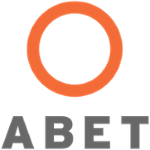Main Content
Program Objectives & Student Outcomes
Accreditation
Our Bachelor of Science (BS) in Mechanical Engineering program is accredited by the Engineering Accreditation Commission (EAC) of ABET, under the commission’s General Criteria and the Program Criteria for Mechanical and Similarly Named Engineering Programs.
Program Educational Objectives (PEOs):
Our Bachelor of Science degree in Mechanical Engineering prepares our students to excel in their careers. Within three to five years of graduating, our graduates will:
-
Attain increased responsibility beyond their entry-level position within Mechanical Engineering or related employment, while recognizing global and societal matters.
-
Become ambassadors for engineering and improve the quality of life in the communities they serve, through collaboration, innovation, and effective communication.
-
Successfully progress within graduate degree programs in Mechanical Engineering, progress toward other professional degrees or professional engineering licenses, and/or continue lifelong learning in a broad range of fields to advance their careers.
-
Successfully serve the profession by acting in a professional and ethical matter.
For always current enrollment information go to: https://irs.siu.edu/interactive-factbook/students/program-enrollments.php
For always current graduation information go to: https://irs.siu.edu/interactive-factbook/students/degrees-conferred.php
Student Outcomes (SOs):
Student outcomes describe what students are expected to know and be able to do by the time of graduation. These relate to the skills, knowledge, and behaviors that students acquire as they progress through the program. In order to meet our program educational objectives, we will prepare our students to know the following:
- The ability to identify, formulate, and solve complex engineering problems by applying principles of engineering, science, and mathematics.
- The ability to apply engineering design to produce solutions that meet specified needs with consideration of public health, safety, and welfare, as well as global, cultural, social, environmental, and economic factors.
- The ability to communicate effectively with a range of audiences.
- The ability to recognize ethical and professional responsibilities in engineering situations and make informed judgments, which must consider the impact of engineering solutions in global, economic, environmental, and societal contexts.
- The ability to function effectively on a team whose members together provide leadership, create a collaborative and inclusive environment, establish goals, plan tasks, and meet objectives.
- The ability to develop and conduct appropriate experimentation, analyze and interpret data, and use engineering judgment to draw conclusions.
- The ability to acquire and apply new knowledge as needed, using appropriate learning strategies.
| Semester | Enrollment | Fiscal Year | Total Graduation |
|---|---|---|---|
| Fall 2021 | 167 | FY 2021 | 49 |
| Fall 2022 | 126 | FY 2022 | 56 |
| Fall 2023 | 126 | FY 2023 | 33 |
| Fall 2024 | 135 | FY 2024 | 25 |
| Fall 2025 | 134 | FY 2025 | 27 |



